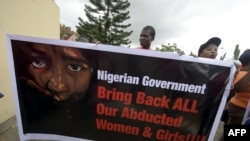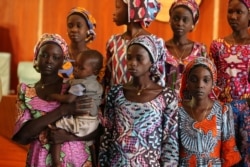Nigerian activists are marking six years since Boko Haram militants abducted 276 schoolgirls from the town of Chibok and kept 112 in captivity.
This year, a live broadcast by the Bring Back Our Girls movement is helping to mark the anniversary, due to travel restrictions imposed because of the coronavirus pandemic.
Allen Manasseh, media and communications director of the Chibok community, is helping fight for the release of the girls.
"I am related to some of the girls," he said. "About 24 of them are from my family, directly my cousins and nieces."
The audacious abduction of the girls by Boko Haram thrust the group and their brutal insurgency into the global spotlight.
Some girls escaped soon after the abduction, and more than 100 others have since been freed through negotiations.
But today, 112 are believed to remain in captivity, including Manasseh's nieces.
"It has not been easy waiting for one day, two days, three days and then down to six years," he said. "That is why some of the parents died as a result of complications that have to do with blood pressure, heart failure, kidney failure and the rest. ... the first woman that died after the abduction was my aunt, who had two of her twin girls abducted and 'til today they are part of those missing."
Advocacy group BBOG started a campaign in 2014 demanding the release of the girls.
Six years later, the group is still waiting, says one of its coordinators, Nifemi Onifade.
"Every year we've had annual commemorations, as well as other landmark commemorations in that time," Onifade said. "So today, like other days, we simply as a movement hold on to hope that this can still be found and make the same demand of bring back our girls."
Over the weekend, special prayers and thanksgiving services were held in Chibok to mark the anniversary.
President Muhammadu Buhari said no government official could attend the event due to the coronavirus lockdown, but promised that the girls have not been forgotten.
Meanwhile, Nigeria is still seeing attacks by Boko Haram despite the coronavirus. One deadly hit in late March killed at least 50 troops. Military authorities say the soldiers were ambushed in Yobe state as they tried to launch an offensive against the group.





